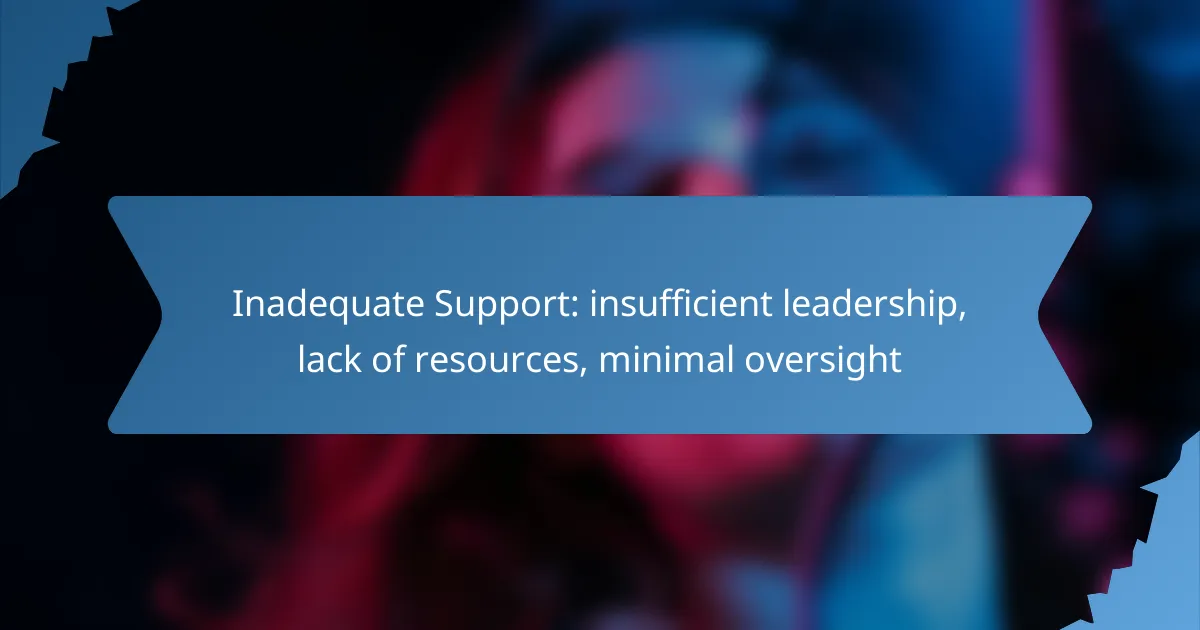Inadequate support within organizations can significantly impede progress and effectiveness. Key factors such as insufficient leadership, lack of resources, and minimal oversight contribute to a challenging work environment, ultimately affecting team performance and cohesion. Addressing these issues requires a comprehensive strategy that enhances leadership capabilities, increases resource availability, and implements robust oversight mechanisms.
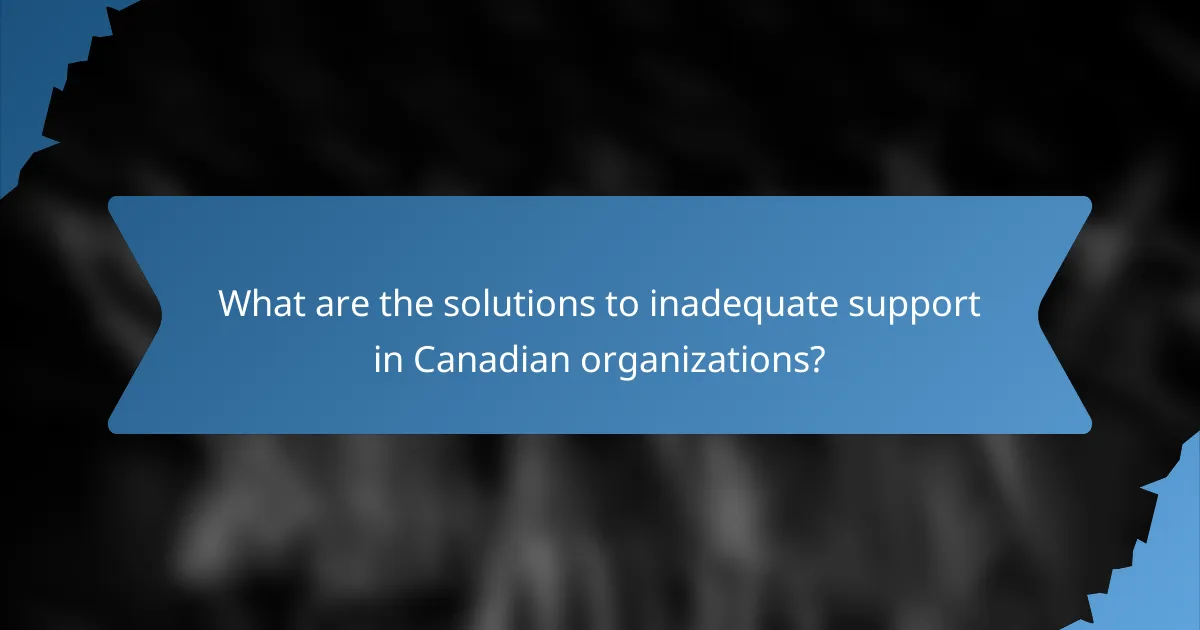
What are the solutions to inadequate support in Canadian organizations?
To address inadequate support in Canadian organizations, a multifaceted approach is essential. This includes enhancing leadership capabilities, increasing resource availability, and establishing effective oversight mechanisms.
Implementing leadership training programs
Leadership training programs are crucial for developing effective leaders who can provide adequate support. These programs should focus on essential skills such as decision-making, conflict resolution, and team management.
Organizations can consider both in-house training and external workshops, ensuring that training is tailored to their specific needs. Regular assessments can help identify skill gaps and measure progress over time.
Increasing resource allocation
Increasing resource allocation is vital for ensuring that teams have the tools and support they need to succeed. This can involve budgeting for additional staff, technology, and training materials.
Organizations should conduct regular reviews of resource distribution to identify areas needing more support. Engaging employees in this process can provide insights into where resources are most needed.
Establishing regular oversight committees
Regular oversight committees can help maintain accountability and ensure that organizational goals are being met. These committees should include diverse members from various departments to provide a well-rounded perspective.
Meetings should be scheduled consistently, and clear agendas should be established to track progress on initiatives. This approach fosters transparency and encourages collaboration across teams.
Enhancing communication channels
Effective communication channels are essential for addressing inadequate support. Organizations should implement various methods, such as regular meetings, newsletters, and digital platforms, to facilitate open dialogue.
Encouraging feedback from employees can help identify communication barriers and improve overall engagement. Utilizing tools like surveys can provide valuable insights into employee satisfaction and areas for improvement.
Utilizing performance management tools
Performance management tools are instrumental in tracking employee progress and identifying support needs. These tools can include software for setting goals, monitoring performance, and providing feedback.
Organizations should ensure that these tools are user-friendly and accessible to all employees. Regular training on how to use these tools effectively can enhance their impact and promote a culture of continuous improvement.

How does insufficient leadership impact team performance?
Insufficient leadership can severely hinder team performance by creating a lack of direction and support. When leaders fail to provide guidance, teams may struggle to meet goals and maintain cohesion.
Decreased employee morale
When leadership is lacking, employees often feel undervalued and unsupported, leading to decreased morale. A team that lacks encouragement and recognition may become disengaged, resulting in a negative work environment.
To combat low morale, leaders should regularly acknowledge employee contributions and foster open communication. Simple gestures, such as team meetings to celebrate achievements, can significantly boost morale.
Increased turnover rates
Insufficient leadership can lead to higher turnover rates as employees seek better opportunities elsewhere. When team members feel unsupported, they are more likely to leave for organizations that offer stronger leadership and career development.
To retain talent, organizations should focus on developing leadership skills within their management teams. Providing training and support for leaders can create a more stable work environment, reducing turnover.
Lower productivity levels
A lack of effective leadership often results in lower productivity levels, as employees may not have clear goals or the resources needed to succeed. Without proper guidance, teams can become disorganized and inefficient.
To improve productivity, leaders should set clear expectations and provide the necessary tools and resources. Regular check-ins and feedback sessions can help keep teams on track and motivated to achieve their objectives.

What resources are essential for effective support?
Effective support relies on several key resources, including access to training materials, technology and software tools, and financial backing for projects. These elements are crucial for fostering a productive environment and ensuring that teams can operate efficiently.
Access to training materials
Access to training materials is vital for equipping team members with the necessary skills and knowledge. This can include online courses, workshops, and instructional manuals that cater to various learning styles.
Organizations should prioritize creating a centralized repository for these materials, ensuring easy access for all employees. Regular updates and feedback loops can help keep the training relevant and effective.
Technology and software tools
Technology and software tools play a critical role in enhancing productivity and communication within teams. Essential tools may include project management software, communication platforms, and data analysis applications.
When selecting technology, consider user-friendliness and integration capabilities with existing systems. Regular training sessions on these tools can help maximize their effectiveness and minimize frustration among users.
Financial support for projects
Financial support for projects is necessary to ensure that teams have the resources they need to succeed. This can involve budgeting for materials, hiring additional staff, or investing in new technologies.
Organizations should establish clear funding guidelines and processes to streamline project approvals. Regularly reviewing project outcomes can help identify areas for future investment and improve overall financial planning.
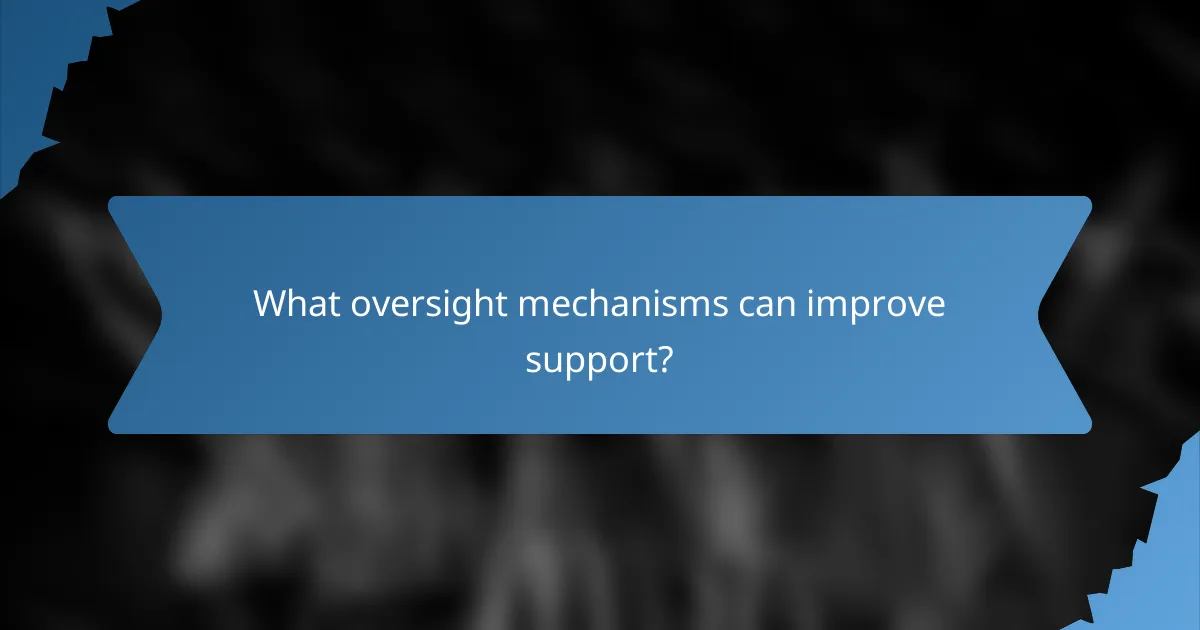
What oversight mechanisms can improve support?
Effective oversight mechanisms can significantly enhance support by ensuring accountability, fostering communication, and providing necessary resources. Implementing structured systems like performance reviews, employee feedback loops, and transparent reporting can create a more supportive environment.
Regular performance reviews
Regular performance reviews are essential for assessing employee contributions and identifying areas for improvement. These evaluations should occur at least biannually to provide timely feedback and set clear expectations.
During performance reviews, managers can discuss goals, recognize achievements, and address any resource gaps. This process helps align individual objectives with organizational priorities, ensuring that employees feel supported and valued.
Feedback loops from employees
Establishing feedback loops allows employees to voice their concerns and suggestions, fostering a culture of open communication. Regular surveys or suggestion boxes can be effective tools for gathering input on leadership effectiveness and resource availability.
By actively soliciting feedback, organizations can identify issues early and implement changes that enhance support. This approach not only empowers employees but also builds trust between staff and management.
Transparent reporting systems
Transparent reporting systems enable organizations to track progress and share outcomes with all stakeholders. Implementing dashboards or regular updates can help ensure that everyone is informed about resource allocation and project status.
Such transparency encourages accountability and can motivate teams to work collaboratively towards common goals. It also allows for quick identification of areas needing additional support or resources, ultimately enhancing overall effectiveness.
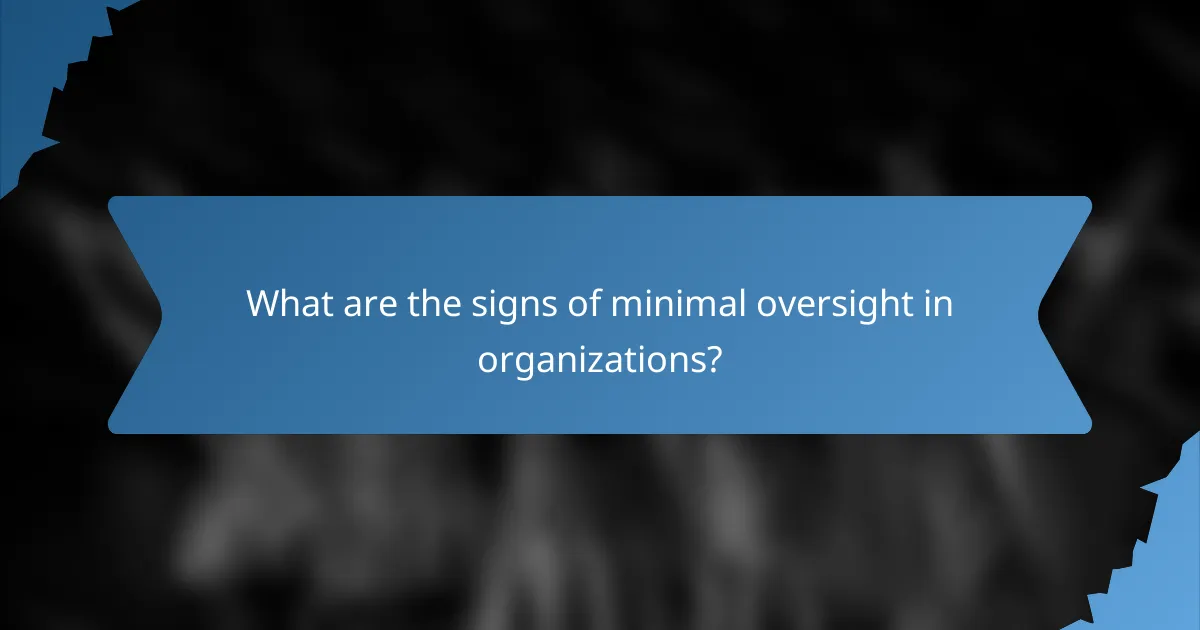
What are the signs of minimal oversight in organizations?
Signs of minimal oversight in organizations include a lack of structured processes, unclear expectations, and insufficient monitoring of performance. These issues can lead to significant operational challenges and hinder overall effectiveness.
Lack of accountability
A lack of accountability manifests when team members do not feel responsible for their tasks or outcomes. This can occur in environments where expectations are vague or where there is no follow-up on performance. To combat this, organizations should establish clear roles and responsibilities, ensuring that everyone understands their contributions to the team’s goals.
Regular performance reviews and feedback sessions can help reinforce accountability. Implementing a system for tracking progress on projects can also encourage individuals to take ownership of their work.
Inconsistent project outcomes
Inconsistent project outcomes are often a direct result of minimal oversight, leading to varying levels of quality and success across different initiatives. When oversight is lacking, teams may not adhere to established standards or best practices, resulting in unpredictable results.
To improve consistency, organizations should standardize processes and provide training to ensure that all team members are equipped with the necessary skills and knowledge. Regularly reviewing project outcomes against set benchmarks can help identify areas for improvement and promote a culture of continuous enhancement.
Poor employee engagement
Poor employee engagement is a common sign of minimal oversight, as employees may feel undervalued or disconnected from their work. When oversight is insufficient, employees often lack direction and support, leading to decreased motivation and productivity.
To foster engagement, organizations should prioritize open communication and provide opportunities for employees to voice their opinions and concerns. Implementing regular check-ins and team-building activities can help create a more cohesive work environment, ultimately enhancing overall engagement and satisfaction.
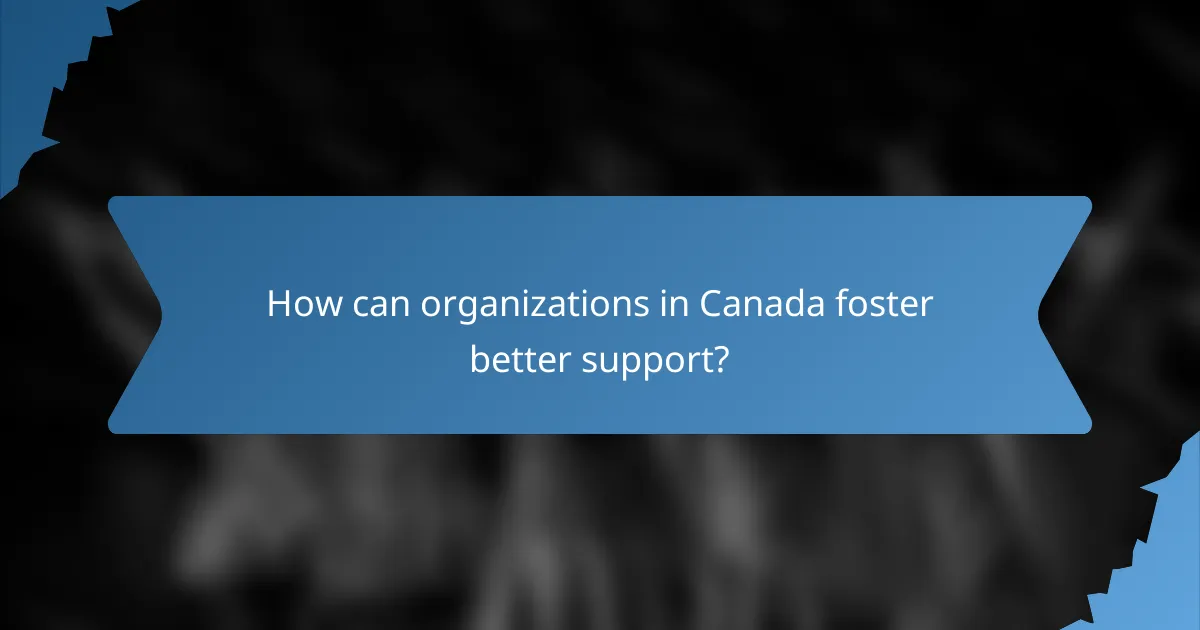
How can organizations in Canada foster better support?
Organizations in Canada can enhance support by prioritizing effective leadership, ensuring adequate resources, and implementing strong oversight mechanisms. By fostering a culture that values employee well-being and engagement, companies can create an environment conducive to productivity and satisfaction.
Creating a supportive workplace culture
Building a supportive workplace culture begins with open communication and trust among team members. Encouraging feedback and actively listening to employee concerns can help identify areas needing improvement. Regular check-ins and team-building activities can also strengthen relationships and enhance collaboration.
Organizations should promote inclusivity and diversity, ensuring that all employees feel valued and respected. This can be achieved through training programs that focus on cultural competency and unconscious bias. Recognizing and celebrating achievements, both big and small, fosters a sense of belonging and motivation.
To maintain a supportive culture, it is essential to establish clear policies that prioritize mental health and work-life balance. Offering flexible work arrangements and access to mental health resources can significantly improve employee morale and retention. Regularly reviewing these policies ensures they remain relevant and effective in meeting employee needs.
